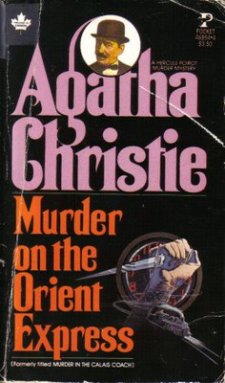I was eating dinner with a friend the other night (Ethiopian, very messy), and in the course of the conversation, and in the spirit of poking fun at myself (I am an easy target), I said that based on my preferred living habits, I would be a great old lady. “Specifically, I would want to be Miss Marple, though,” I declared. “Who?” he asked quizzically. “You know, the Agatha Christie character?” I replied. “Who?” he said again. Licking my fingers with as nonjudgmental a facial expression as possible, I attempted to explain my love for Agatha and for her character Miss Marple – her strength of character, her wit, her wry and cheerful understanding of the way small villages can show the very worst of human nature.
Oh, Miss Marple. She, along with the other great creation to come out of the brain of Agatha Christie, the inimitable Hercule Poirot, are two of the fictional characters with whom my childhood self identified strongly. I grew up on a steady supply of Agatha Christie novels, starting with The ABC Murders, a grisly Hercule Poirot novel that taught me at the impressionable young age of eleven that *SPOILER ALERT* I could be a murderer’s target just because the first letter of my last name happened to match that of the town that in which I was living, so I could perhaps be strangled on a beach with my scarf just to mask another murder…
As much as I enjoyed that initial foray into the world of Agatha Christie, my favorite novels were the ones that took me on a colonial adventurer’s dream journey to wild and exotic places like Baghdad, the Nile, and, of course, the Orient Express – the train that spanned the European continent to end among the minarets of Istanbul. Among the ruthless characters who *SPOILER ALERT AGAIN* all turn out to be in on the murder, I found myself transported to small cabins decorated in worn-out red velvet, hearing accents that came from countries my 13-year-old self had never even heard of, trying to understand the complicated motives behind love, hatred, trust, compassion, and, yes, murder. And when at the end, Hercule Poirot, great detective that he is, calls together all the suspects for his great reveal and ends up *LAST SPOILER ALERT* letting them go even though he knows they are all murderers (!!!), it made me ponder what is right and what is wrong, whether ends can justify means, and other big philosophical questions that made me feel very intellectual and angsty at the time, and that I am still unable to answer.
Basically, that book helped me develop as a human being. Thanks, Monsieur Poirot. Thanks, Agatha.
I started thinking about that book the other day again when I read this article in the New York Times travel section about a man who traveled the length of the Orient Express’s original path, which this time required him to make a trip of seven different legs, none of which contained “the ‘choicest morsels’ of Poirot and his companions, the ‘delicate cream cheese’ after dinner and the attendants happy to provision an exiled princess or American captain of industry with sparkling water and fresh-squeezed orange juice.”
“But what does remain,” says our intrepid author, “is the chance to see Europe as a continuous, unfolding expanse, and not simply as the crow — or discount-airline — flies.”
Perhaps from Poirot I, too, developed my preference to travel by train (or by bus, if necessary) rather than by budget flight. I like the masochistic struggle, the scenes that pass me by, the conversations had in the middle of the night in tiny compartments with random strangers. When my sister and I embarked on a winter trip around Eastern Europe in December 2012-January 2013, we planned out our journey by train in advance, spending hours tracing the routes and lovingly, giddily marking border crossings and currency exchanges to be made. On the trains, we watched snow covered mountains and graffiti covered slums pass us by. The ruins of castles loomed over us and cows stared vacuously as we whizzed by. People got on and off; we exchanged stories and games and lots of different languages and played music with our cabin companions. We got off in majestic stations past their primes and tried to negotiate our ways to city centers with the proper currency and without misplacing any of our belongings. We ate sandwiches and chips and the cheapest, most delicious things we could find. We slept sitting up and slumped over and on our backpacks and on each others shoulders.
Yes, Poirot – in his mustachioed pompousness – was the one who inspired me to travel like this (in my frugal way that he would certainly deign unfit for himself), to ponder human nature, to question the obvious and easy answers.
And to my dinner companion who asked me “Who?” in response to my reference to Agatha Christie, well, I bought him his very own $3 copy of The ABC Murders at a nearby used bookstore, and I hope that he will read it and get a glimmer of the appreciation I have for Agatha.
